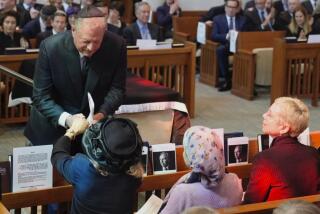Choice May Help Gore Slip From Clinton Shadow
- Share via
WASHINGTON — Al Gore’s selection of Sen. Joseph I. Lieberman of Connecticut has made history. Whether it also helps make Gore president remains to be seen.
The selection of Lieberman, an Orthodox Jew, constitutes the most dramatic statement of religious inclusion since John F. Kennedy won election as the nation’s first--and so far only--Catholic president in 1960. But it’s not clear how much the pick can boost Gore in his immediate problem: overcoming Republican George W. Bush’s double-digit lead in the polls.
Lieberman may be uniquely positioned to help Gore with one of his key dilemmas--redefining his relationship with President Clinton.
As the first prominent Democratic critic of Clinton’s affair with Monica S. Lewinsky, Lieberman should help Gore separate himself from the taint of Clinton’s personal behavior. Still, Lieberman’s role as chairman of the Democratic Leadership Council--a centrist group influential in shaping Clinton’s agenda--reaffirms the ticket’s commitment to the president’s policy direction.
Lieberman’s culturally conservative streak--he has joined leading conservatives in criticizing the entertainment industry for excessive depictions of violence and sexuality--could strengthen Gore with morally traditional swing voters now flocking to Bush.
But Lieberman comes from a state that Gore should be able to win on his own. And, with his centrist voting record, he may do little to excite core Democratic constituencies such as blue-collar union members who have been tepid toward the vice president.
Also looming over the choice is the murky, and inherently unanswerable, question of whether Lieberman’s religion will repel some voters. Most experts expect little effect, and two recent polls have found that fully 9 in 10 Americans now say they would vote for a Jewish president.
But analysts acknowledge that voters resistant to a Jewish president could be reluctant to admit those attitudes to a pollster, which means that no one can safely say how large a potential backlash, if any, may come.
“I think we do not know how much hidden hesitancy or worse is out there at the thought of the potential of a Jewish president,” says Norman Podhoretz, a neoconservative author who has written extensively on Jewish assimilation in America.
Most experts--at least as of now--doubt that Lieberman’s religion will figure in this campaign as overtly as Kennedy’s did in the 1960 race. In that campaign, Kennedy faced such powerful religious resistance that he was compelled to make a dramatic appearance before a council of Protestant ministers in Houston. In his speech, Kennedy declared his commitment to the separation of church and state and pledged that he would neither “request or accept instruction on public policy from the pope.”
Even so, Kennedy, as the first Catholic presidential nominee since Al Smith in 1928, received a smaller share of the vote among Southern evangelicals than Democrats usually did in that era, said John C. Green, a University of Akron political scientist who specializes in religion and politics.
Green, though, is dubious that Lieberman’s religion will loom nearly as large. “We are much more tolerant of religious differences than we were then and Jews are really counted as one of the mainstream religions in America,” he said.
There’s considerable evidence--in both polling and practical politics--to support Green’s view.
In the last several decades, there’s been a decline in the percentage of the population expressing anti-Semitic statements, noted Tom W. Smith, a pollster at the National Opinion Research Center. As part of that trend, the share of Americans who say they would vote for a Jewish president has increased from about three-fifths in 1958 to the 90% now, Smith said.
That figure has held steady for about 30 years and is actually higher than the number for some other religious faiths, Smith said. In a 1996 survey he conducted, only 7 in 10 Americans said they would vote for an evangelical Christian and just 6 in 10 would support a Muslim (only about half said they would back an atheist).
To Smith, these figures suggest most voters are not hesitant about expressing their reluctance to vote for politicians because of their religious views. From that he concludes that even if some of those who say they would vote for a Jewish president are lying, the numbers are not huge.
Practical experience also suggests that a Jewish background has not been an insuperable barrier with non-Jewish voters. Eleven Jews serve in the 100-member U.S. Senate--a far greater percentage than the overall Jewish population of 2.3% for the nation as a whole. Six come from parts of the country with larger populations of Jews--the Northeast and California (whose two senators, Barbara Boxer and Dianne Feinstein, are both Jewish). But the other five represent Wisconsin (where both senators are Jewish), Michigan, Minnesota and Oregon.
Moreover, noted Green, if there is any backlash against Lieberman, it’s most likely to come among Southern evangelical Protestants in states Gore will probably lose anyway. And even that may be muted by Lieberman’s good relations with conservative Christian leaders, whom he has also worked with on efforts to protect religious freedoms abroad. Indeed, Lieberman serves as the chair of the Center for Jewish and Christian Values, a political group whose board includes such prominent evangelical conservatives as Gary Bauer and Ralph Reed.
“He is going to get the votes of some evangelicals,” predicted William J. Bennett, secretary of Education under President Reagan.
It is Lieberman’s cultural conservatism that caused experts in both parties to agree that almost no one Gore could have selected makes a stronger statement of personal independence from Clinton.
Lieberman has supported Clinton on most key policy issues, from welfare reform to free trade. But he was not only the first Democrat to condemn Clinton’s affair with Lewinsky from the Senate floor in 1998, he was also a stern critic of the administration’s 1996 campaign fund-raising activities.
Bennett, while praising Lieberman, said the selection may inadvertently contrast Gore’s own support for Clinton during impeachment with Lieberman’s more independent stance. (Ultimately, Lieberman voted against removing Clinton from office.)
But Democrats think Lieberman’s record will help Gore escape from the shadow of Clinton’s controversies. “It will be harder to run a campaign of innuendo and guilt by association against this ticket,” predicted Al From, president of the Democratic Leadership Council.
On policy matters, Lieberman’s selection points in the opposite direction: toward continuity with Clinton’s centrist agenda. “He helps Gore by re-cementing the direction for this party,” From said.
As chairman of the DLC, Lieberman, in fact, has been more willing to challenge liberal traditions than Clinton or Gore. Bush’s campaign overstated the case when it asserted in a statement Monday that Gore “has chosen a man whose positions are more similar to Gov. Bush’s than his own.”
But Lieberman does echo Bush in supporting private-school vouchers for low-income parents whose children are stuck in poorly performing schools. (Gore staunchly opposes the idea.) After some early interest in the idea, Lieberman now opposes Bush’s proposal to divert part of the Social Security payroll tax into individual accounts workers could invest for their own retirement. But he has left open the door to further increasing the Social Security retirement age. Bush has similarly said he’s considering that idea, while Gore has condemned it.
And as Republicans gleefully pointed out Monday, Lieberman is to Gore’s right on some other issues, such as deploying a national missile defense system and limiting product liability damage awards.
From a campaign perspective, though, the most important element of Lieberman’s agenda is likely to be his persistent criticism of the movie and television industries and video game makers. While that’s likely to draw some grumbling in Hollywood, Democrats are optimistic it may earn Gore a second look with socially conservative swing voters (such as married women and blue-collar men) now cool to the vice president.
Republican pollster Frank Luntz agrees. In a recent focus group he conducted with swing voters in California, Luntz said, Lieberman “hit a home run with Republicans and independents” when he played a tape of the senator criticizing Hollywood.
“Not many people will vote for Gore because of Lieberman,” Luntz says, “but they will reconsider Gore because of Lieberman. Now it’s up to Gore.”
*
Times staff writers Nick Anderson, Geraldine Baum and Sunny Kaplan contributed to this story.
More to Read
Get the L.A. Times Politics newsletter
Deeply reported insights into legislation, politics and policy from Sacramento, Washington and beyond. In your inbox twice per week.
You may occasionally receive promotional content from the Los Angeles Times.










